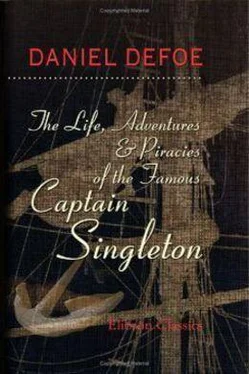We passed those seas with less difficulty than in other places, the winds to the south of Java being more variable, and the weather good, though sometimes we met with squally weather and short storms; but when we came in among the Spice Islands themselves we had a share of the monsoons, or trade–winds, and made use of them accordingly.
The infinite number of islands which lie in these seas embarrassed us strangely, and it was with great difficulty that we worked our way through them; then we steered for the north side of the Philippines, when we had a double chance for purchase, viz., either to meet with the Spanish ships from Acapulco, on the coast of New Spain, or we were certain not to fail of finding some ships or junks of China, who, if they came from China, would have a great quantity of goods of value on board, as well as money; or if we took them going back, we should find them laden with nutmegs and cloves from Banda and Ternate, or from some of the other islands.
We were right in our guesses here to a tittle, and we steered directly through a large outlet, which they call a strait, though it be fifteen miles broad, and to an island they call Dammer, and from thence N.N.E. to Banda. Between these islands we met with a Dutch junk, or vessel, going to Amboyna: we took her without much trouble, and I had much ado to prevent our men murdering all the men, as soon as they heard them say they belonged to Amboyna: the reasons I suppose any one will guess.
We took out of her about sixteen ton of nutmegs, some provisions, and their small–arms, for they had no great guns, and let the ship go: from thence we sailed directly to the Banda Island, or Islands, where we were sure to get more nutmegs if we thought fit. For my part, I would willingly have got more nutmegs, though I had paid for them, but our people abhorred paying for anything; so we got about twelve ton more at several times, most of them from shore, and only a few in a small boat of the natives, which was going to Gilolo. We would have traded openly, but the Dutch, who have made themselves masters of all those islands, forbade the people dealing with us, or any strangers whatever, and kept them so in awe that they durst not do it; so we could indeed have made nothing of it if we had stayed longer, and therefore resolved to be gone for Ternate, and see if we could make up our loading with cloves.
Accordingly we stood away north, but found ourselves so entangled among innumerable islands, and without any pilot that understood the channel and races between them, that we were obliged to give it over, and resolved to go back again to Banda, and see what we could get among the other islands thereabouts.
The first adventure we made here had like to have been fatal to us all, for the sloop, being ahead, made the signal to us for seeing a sail, and afterwards another, and a third, by which we understood she saw three sail; whereupon we made more sail to come up with her, but on a sudden were gotten among some rocks, falling foul upon them in such a manner as frighted us all very heartily; for having, it seems, but just water enough, as it were to an inch, our rudder struck upon the top of a rock, which gave us a terrible shock, and split a great piece off the rudder, and indeed disabled it so that our ship would not steer at all, at least not so as to be depended upon; and we were glad to hand all our sails, except our fore–sail and main–topsail, and with them we stood away to the east, to see if we could find any creek or harbour where we might lay the ship on shore, and repair our rudder; besides, we found the ship herself had received some damage, for she had some little leak near her stern–post, but a great way under water.
By this mischance we lost the advantages, whatever they were, of the three sail of ships, which we afterwards came to hear were small Dutch ships from Batavia, going to Banda and Amboyna, to load spice, and, no doubt, had a good quantity of money on board.
Upon the disaster I have been speaking of you may very well suppose that we came to an anchor as soon as we could, which was upon a small island not far from Banda, where, though the Dutch keep no factory, yet they come at the season to buy nutmegs and mace. We stayed there thirteen days; but there being no place where we could lay the ship on shore, we sent the sloop to cruise among the islands, to look out for a place fit for us. In the meantime we got very good water here, some provisions, roots, and fruits, and a good quantity of nutmegs and mace, which we found ways to trade with the natives for, without the knowledge of their masters, the Dutch.
At length our sloop returned; having found another island where there was a very good harbour, we ran in, and came to an anchor. We immediately unbent all our sails, sent them ashore upon the island, and set up seven or eight tents with them; then we unrigged our top–masts, and cut them down, hoisted all our guns out, our provisions and loading, and put them ashore in the tents. With the guns we made two small batteries, for fear of a surprise, and kept a look–out upon the hill. When we were all ready, we laid the ship aground upon a hard sand, the upper end of the harbour, and shored her up on each side. At low water she lay almost dry, so we mended her bottom, and stopped the leak, which was occasioned by straining some of the rudder irons with the shock which the ship had against the rock.
Having done this, we also took occasion to clean her bottom, which, having been at sea so long, was very foul. The sloop washed and tallowed also, but was ready before us, and cruised eight or ten days among the islands, but met with no purchase; so that we began to be tired of the place, having little to divert us but the most furious claps of thunder that ever were heard or read of in the world.
We were in hopes to have met with some purchase here among the Chinese, who, we had been told, came to Ternate to trade for cloves, and to the Banda Isles for nutmegs; and we would have been very glad to have loaded our galleon, or great ship, with these two sorts of spice, and have thought it a glorious voyage; but we found nothing stirring more than what I have said, except Dutchmen, who, by what means we could not imagine, had either a jealousy of us or intelligence of us, and kept themselves close in their ports.
I was once resolved to have made a descent at the island of Dumas, the place most famous for the best nutmegs; but friend William, who was always for doing our business without fighting, dissuaded me from it, and gave such reasons for it that we could not resist; particularly the great heats of the season, and of the place, for we were now in the latitude of just half a degree south. But while we were disputing this point we were soon determined by the following accident:—We had a strong gale of wind at S.W. by W., and the ship had fresh way, but a great sea rolling in upon us from the N.E., which we afterwards found was the pouring in of the great ocean east of New Guinea. However, as I said, we stood away large, and made fresh way, when, on the sudden, from a dark cloud which hovered over our heads, came a flash, or rather blast, of lightning, which was so terrible, and quivered so long among us, that not I only, but all our men, thought the ship was on fire. The heat of the flash, or fire, was so sensibly felt in our faces, that some of our men had blisters raised by it on their skins, not immediately, perhaps, by the heat, but by the poisonous or noxious particles which mixed themselves with the matter inflamed. But this was not all; the shock of the air, which the fracture in the clouds made, was such that our ship shook as when a broadside is fired; and her motion being checked, as it were at once, by a repulse superior to the force that gave her way before, the sails all flew back in a moment, and the ship lay, as we might truly say, thunder–struck. As the blast from the cloud was so very near us, it was but a few moments after the flash that the terriblest clap of thunder followed that was ever heard by mortals. I firmly believe a blast of a hundred thousand barrels of gunpowder could not have been greater to our hearing; nay, indeed, to some of our men it took away their hearing.
Читать дальше












